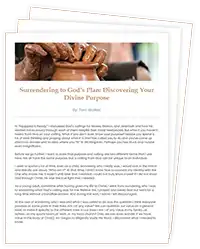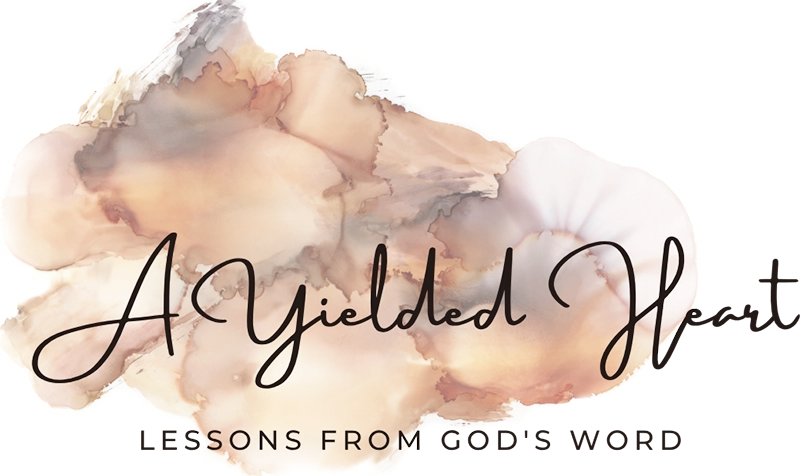
Things don’t have to be going perfectly in your life for you to praise God. In fact, a true test of your faith is when circumstances are opposite of what you desire or hope for. It’s easy to bring forth a praise when things are going so well in your life. But when you go through situations or seasons of emotional, physical, or financial setbacks, it can be a downright challenge to even think straight, let alone rejoice in God. Anxiety can creep in, hope can be depleted and replaced with fear, and your thoughts can become consumed with how bad things are in the present and how bad things will be in the future (or so you begin to irrationally think). I’ve been there time and time again and can attest to the fact that your anxious thoughts can be a slippery slope downhill to despair and self-pity if you do not refocus on your Heavenly Father and His goodness.
You must make up your mind and be convinced in your heart that no matter what is happening in your life or in the world around you, you will maintain what I call a “Still-I-Will” mindset—one that displays your unconditional and absolute trust, love, and devotion to God in the face of adversity or persecution. It’s the result of an intimate relationship with Him.
It has been my remedy for triumphing over tribulations, and I learned it first from the prophet Habakkuk.
Still, I Will Rejoice
God shared with the prophet Habakkuk that He was going to allow the Babylonian empire to execute judgement on Judah for their continual sin, as they had forsaken Him. Upon hearing this and thinking about what would tragically happen to his beloved nation, Habakkuk experienced inner turmoil as described in Chapter 3, verse 16: I heard and my whole inner self trembled; My lips quivered at the sound. Decay and rottenness enter my bones, And I tremble in my place. Because I must wait quietly for the day of distress, For the people to arise who will invade and attack us. (CJB) These are real and raw emotions, but even with that, Habakkuk chose a perspective of hope and devotion to God in the face of calamity:
For even if the fig tree doesn’t blossom, and no fruit is on the vines, even if the olive tree fails to produce and the fields yield no food at all, even if the sheep vanish from the sheep pen, and there are no cows in the stalls; still, I will rejoice in Adonai, I will take joy in the God of my salvation. Habakkuk 3:17-18 (CJB)
Based on his relationship and knowledge of God, Habakkuk was steadfast in his commitment and was determined that no matter how bad things would get for the nation, he would not allow it to take away his joy or praise. That’s an attitude worth adopting. No matter what is happening in your life and in the world around you—even in worse-case scenarios—you must trust in God’s sovereignty with ALL YOUR HEART. Do not blame or get angry at God; instead, open your mouth and tell Him, “Still, I will rejoice in you, Father.”
Still, I Will Worship Only You
I found my next inspiration in the book of Daniel. There was a proclamation from Nebuchadnezzar, king of Babylon, that anyone who didn’t fall down and worship the gold statue he had set up would be thrown into a blazing hot furnace—certain death. Well, everyone did just that. When the sound of musical instruments was heard, people from all nations and tongues bowed down and worshipped the idol. Everyone except the Jews who served God wholeheartedly, namely Shadrach, Meshach, and Abed-Nego. Read their answer to the king when it was reported to him that they had disobeyed his orders:
“Your majesty, if our God, whom we serve, is able to save us, he will save us from the blazing hot furnace and from your power. BUT EVEN IF HE DOESN’T [emphasis mine], we want you to know, your majesty, that we will neither serve your gods nor worship the gold statue which you have set up. Daniel 3:17-18 (CJB)
They believed and trusted that their God was able to save them. They were committed to obeying Him, refusing to bow down and worship the idol, even if it meant their death. Their mind’s attitude and heart’s belief were that God was worthy of their service and worship whether it worked out in their favor or not. This devotion and the miraculous intervention from God on the Jews’ behalf served as a display of God’s glory to Nebuchadnezzar and all the other nations. God will use your steadfastness to benefit not just you, but others.
Still, I Will Pray and Sing Praises
The final example I will share comes from the book of Acts. While in Macedonia to proclaim the Good News as instructed by the Holy Spirit, Paul and Silas were severely beaten and thrown into jail, chained. These circumstances are enough to cause anyone’s emotions to become a mess, taking over all good judgement, thoughts, and hope; yet Scripture reveals that Paul and Silas maintained a “Still-I-Will” attitude that can be used as a lesson for believers today.
After striking them many times [with the rods], they threw them into prison, commanding the jailer to guard them securely. He, having received such a [strict] command, threw them into the inner prison (dungeon) and fastened their feet in the stocks [in an agonizing position]. But about midnight when Paul and Silas were praying and singing hymns of praise to God, and the prisoners were listening to them… Acts 16:23-25 (AMP)
Think about these circumstances for a moment: they were beaten, therefore in pain; jailed, not knowing if or when they might be released; AND their feet in stocks, therefore prohibited in movement and couldn’t physically relax. Paul and Silas could have gotten depressed, angry, or fearful and easily given in to those feelings. But the “still, I will” in them couldn’t be contained. They resorted to praying and singing, and not in a hush-hush way, but with boldness from the depths of their souls. I’m sure the other prisoners were probably perplexed, wondering what in the world could they be praising God for.

These servants realized and trusted in the sovereignty of God—that He has supreme authority and power over all—and no threat, opposition, or confrontation of death could make them doubt Him. Having that revelation allowed them to rest in Him. To endure with patience. To continue proclaiming the Good News. To continue trusting in their God.
Search the Scriptures for yourself and find many other examples that will encourage you to never stop trusting and praising God in the face of any kind of trouble. Your faith is what will get you through and you’ll have a testimony for others.
Read More Lessons

“You Give Them Something to Eat”: Living Out the Authority Christ Has Given You
Read more

Rediscovering Reverence: Setting Our Hearts to Treasure God Above All Else
Read more

Experiencing God’s Goodness: The Importance of Asking God for What You Want
Read more
Printable Lessons

